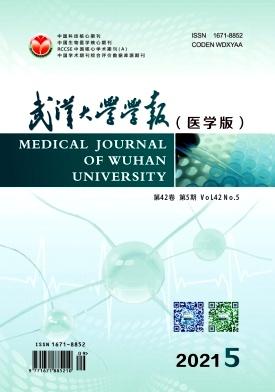Evaluation of psychological status of 82 patients with rectal cancer after operation in Wuhan epidemic area of COVID‑19 and the value of WeChat follow‑up by doctors
Q4 Medicine
引用次数: 0
Abstract
Objective: To investigate the postoperative psychological status of rectal cancer patients during the outbreak of coronavirus disease 2019 (COVID‑19) epidemic in Wuhan, and to evaluate the outcomes of WeChat follow‑up. Methods: A total of 41 patients with rectal cancer after operation were included into observation group and were followed up by doctors through WeChat, and another 41 postoperative cases without WeChat follow⁃up were set as control group. The Symptom Checklist 90 (SCL‑90), Self‑Rating Depression Scale (SDS), Self‑Rating Anxiety Scale (SAS), and Pittsburgh Sleep Quality Index (PSQI) were adopted to evaluate all the patients' postoperative psychological status before discharge from hospital and two months later. Results: After two months, the scores of SCL‑90, SAS, and SDS, respectively,of all patients showed significantly changes (t=1.487, 1.203, and 1.578, respectively, all P 0.05), but the total scores of PSQI in observation group showed a significant decrease after two months' WeChat follow⁃up and were lower than in control group (t=8.369, P<0.05). Conclusion: During the outbreaking of COVID⁃19 epidemic in Wuhan, the scores of SCL‑90, SAS, and SDS in the post⁃operative patients were all decreased, but the total scores of PSQI in WeChat follow‑up group was significantly lower than that in the control group. Doctors' active WeChat follow‑up on patients can alleviate their fear, anxiety, depression, and especially, and improve their sleep quality. © 2021, Editorial Board of Medical Journal of Wuhan University. All right reserved.武汉新冠肺炎疫区82例直肠癌术后患者心理状态评价及医生微信随访价值
目的:了解2019冠状病毒病(COVID - 19)在武汉流行期间直肠癌患者术后的心理状态,并评价微信随访结果。方法:将41例直肠癌术后患者作为观察组,由医生通过微信进行随访;将41例术后无微信随访的患者作为对照组。采用症状自评量表(SCL - 90)、抑郁自评量表(SDS)、焦虑自评量表(SAS)和匹兹堡睡眠质量指数(PSQI)评估所有患者术后出院前和2个月后的心理状态。结果:随访2个月后,所有患者的SCL - 90、SAS、SDS评分均有显著变化(t=1.487、1.203、1.578,P均为0.05),观察组患者PSQI总分在随访2个月后显著降低,且低于对照组(t=8.369, P<0.05)。结论:武汉新冠肺炎疫情期间,手术后患者SCL - 90、SAS、SDS评分均下降,但微信随访组PSQI总分显著低于对照组。医生对患者积极的微信随访可以减轻他们的恐惧、焦虑、抑郁,尤其是改善他们的睡眠质量。©2021,武汉大学医学杂志编辑委员会。版权所有。
本文章由计算机程序翻译,如有差异,请以英文原文为准。
求助全文
约1分钟内获得全文
求助全文

 求助内容:
求助内容: 应助结果提醒方式:
应助结果提醒方式:


